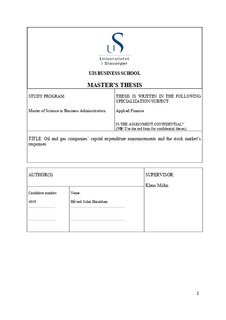| dc.description.abstract | This thesis attempts to find possible explanations to the research problem: Why does the stock prices of oil and gas companies not always respond in accordance with neoclassical standard financial theory when companies announce changes in capital expenditure plans? The research problem is deeply rooted within principal-agent theory, and to find answers two theories are applied. First, neoclassical standard financial theory, that assumes all market participants are rational (Becker, 1962). Second, behavioral corporate finance theory, with the biased managers perspective, that assumes managers are biased due to overconfidence, while all other market participants are rational (Baker & Wurgler, 2013; Malmendier, 2018).
To solve the research problem empirically, two hypothesis are tested. First, to answer whether the news presented on the event days have any effect on the behavior of the firms’ stock prices. Three event studies are conducted to find evidence of abnormal return responses to eight integrated oil and gas companies’ announcements. The three models confirms correlations, where news including plans to increase capital expenditure, result in statistically significant negative average cumulative abnormal return responses ranging from -0.33 to -2.00 percent in the different event windows. Second, to answer whether the capital expenditure news have any effect on the behavior of the firms’ stock prices. Three regression analysis attempts to determine if the capital expenditure news cause abnormal (daily) return responses. One analysis reveals causality, if the firms increase capital expenditure, they experience a statistically significant negative abnormal (daily) return response of -1.66 percent.
The stock market’s negative responses are first discussed within neoclassical standard financial theory, where abundant free cash flow and increased managerial power might have caused rational overinvestment in negative net present value projects (Jensen, 1986; McConnell & Muscarella, 1985). Strengthening the issue, managers’ compensation contracts were potentially misaligned in the sample period (Hall & Liebman, 1998; Hall & Murphy, 2000, 2002). Second, within behavioral corporate finance theory, the responses might indicate that managers are overconfident, causing irrational overinvestment in negative net present value projects (Malmendier & Tate, 2008). Both theories point towards excessive use of internal funds as the culprit of the stock market’s negative responses. Where restricting managers’ use of internal financing, improving the boards of directors and monitoring are potential solutions (Baker & Wurgler, 2013; M. Harris & Raviv, 1990; Jensen, 1986; Malmendier & Tate, 2005, 2008, 2015). | nb_NO |

